Abstract
DNA-membrane complexes have been obtained from Escherichia coli by using a freeze-thaw lysis procedure that avoids lysozyme and detergents. Complexes made in this manner and containing DNA near the origin of replication are uniquely sensitive to ionic strength, Pronase, and trypsin. There is approximately one such complex per chromosomal origin. The sensitivities suggest that origin-specific binding is mediated by a protein. By using these unique characteristics to distinguish origin-specific complexes from the majority of DNA-membrane binding sites, it was found that the origin-specific binding persists after termination of chromosomal replication.
Full text
PDF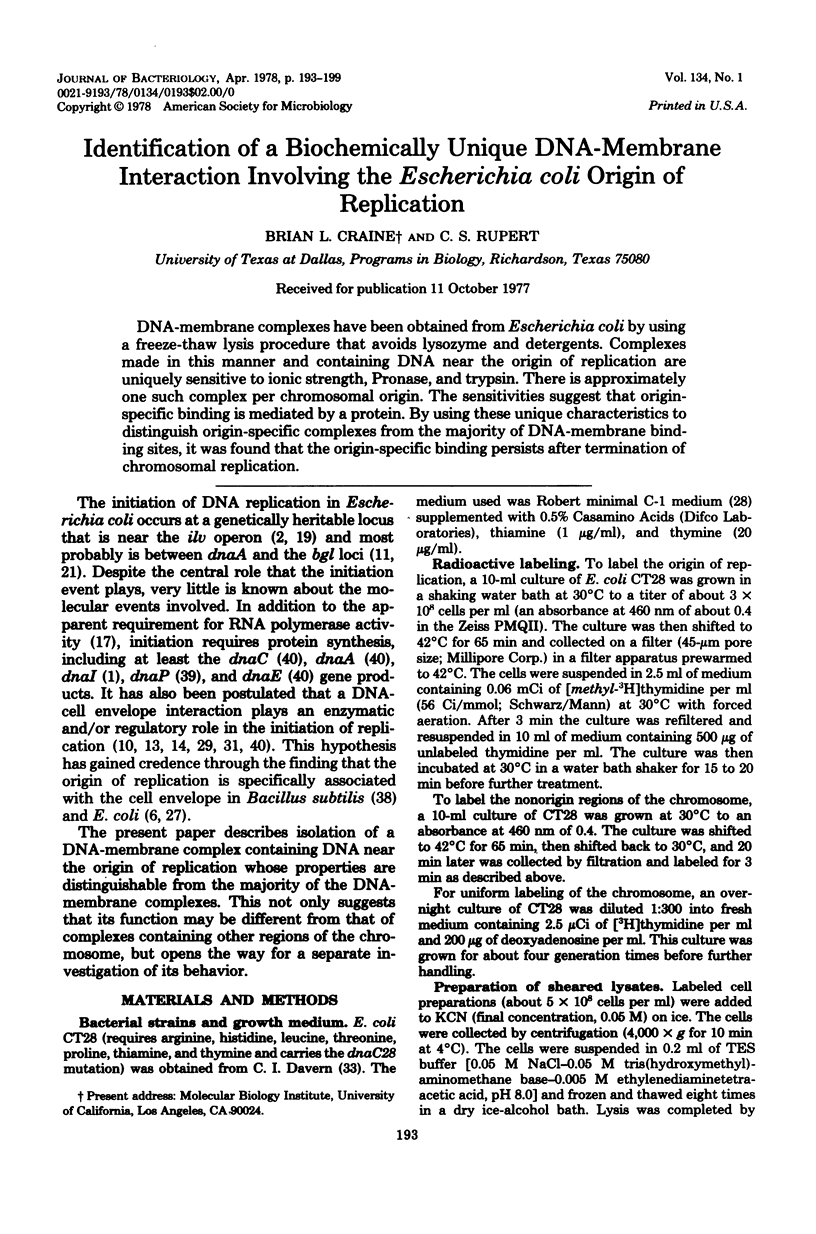
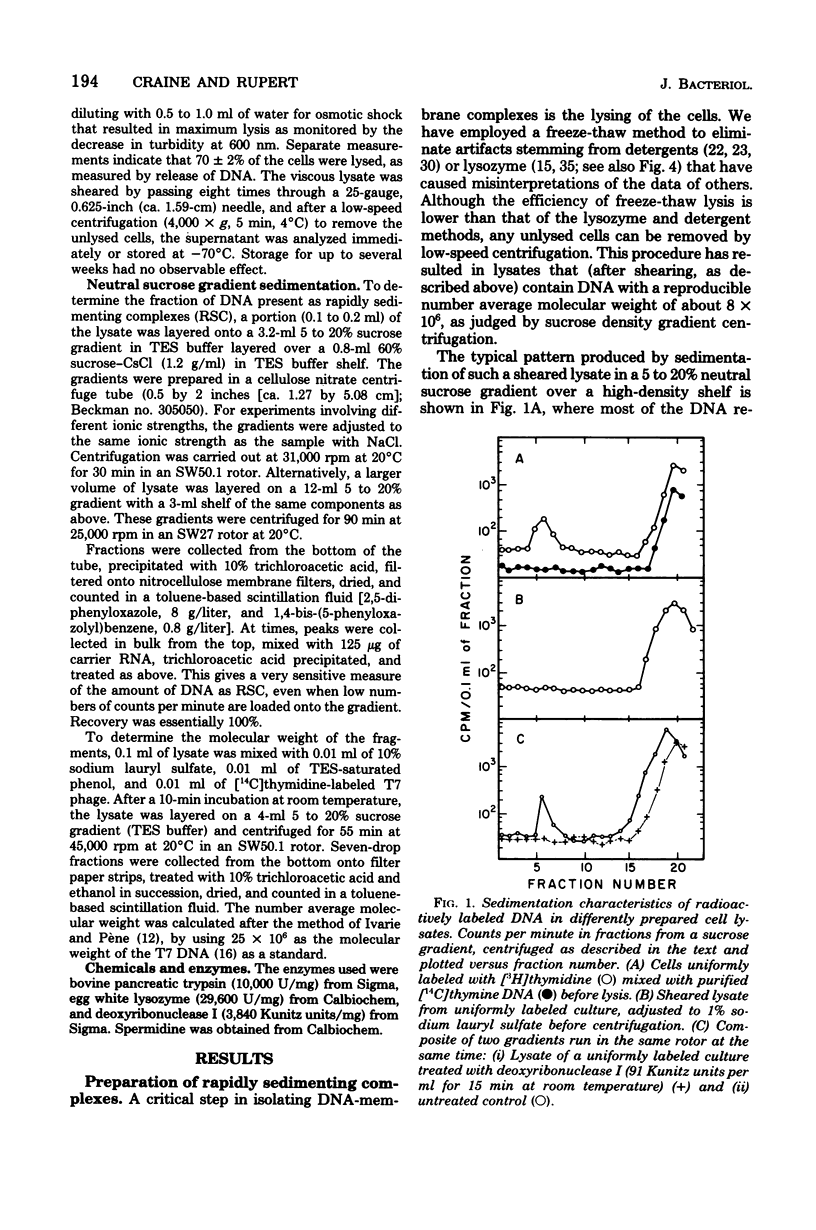
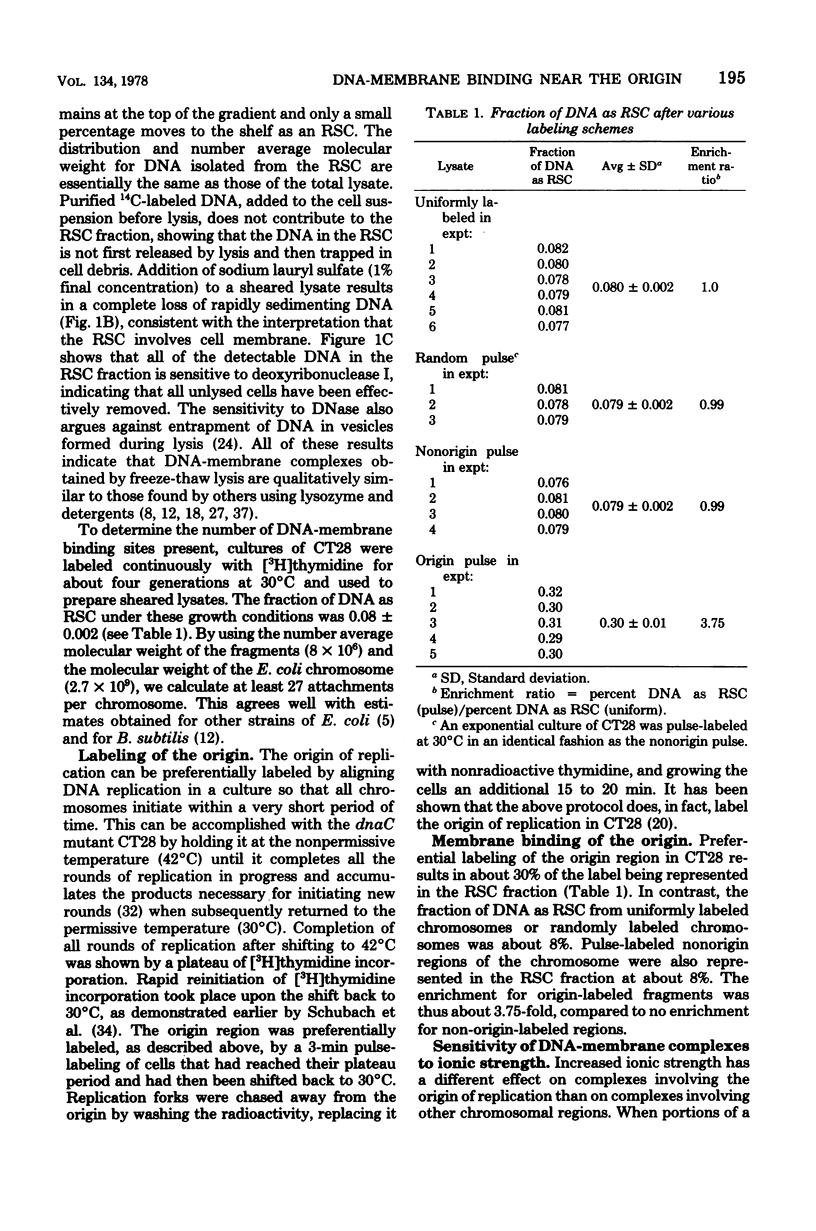
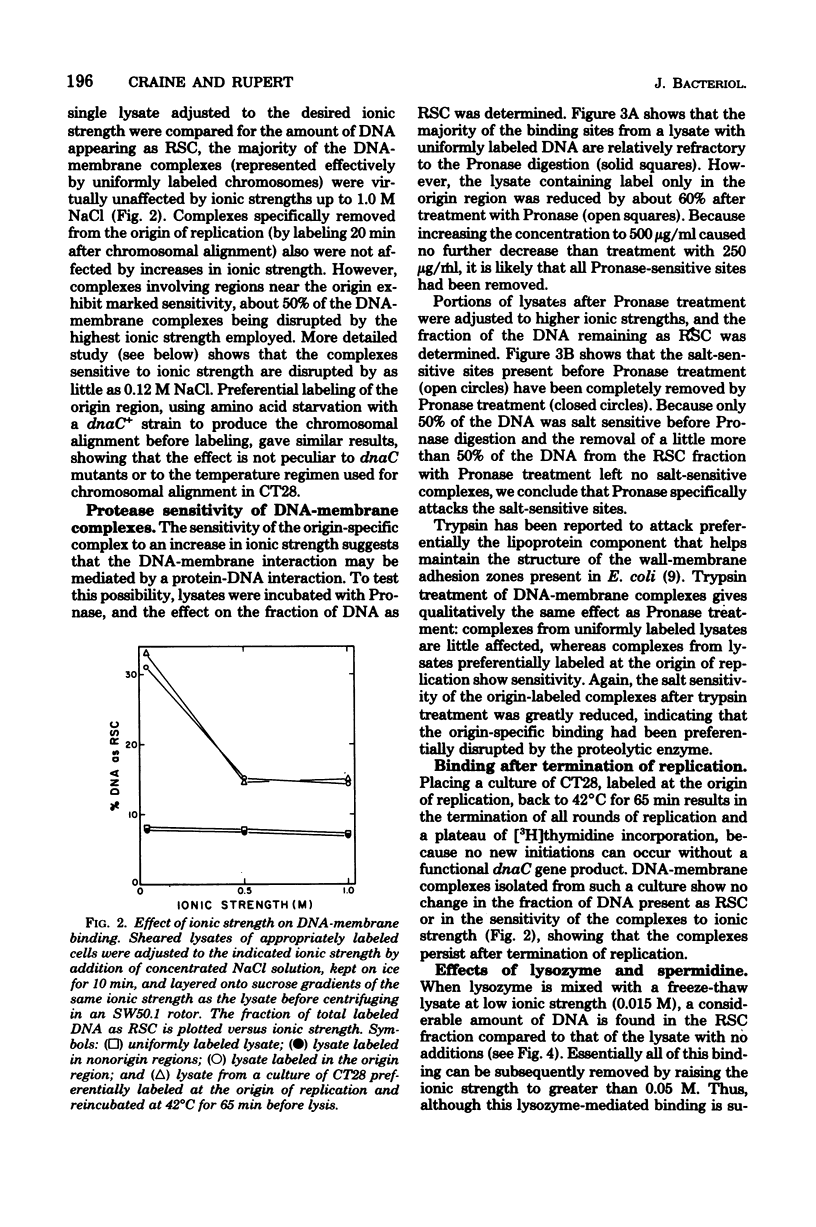
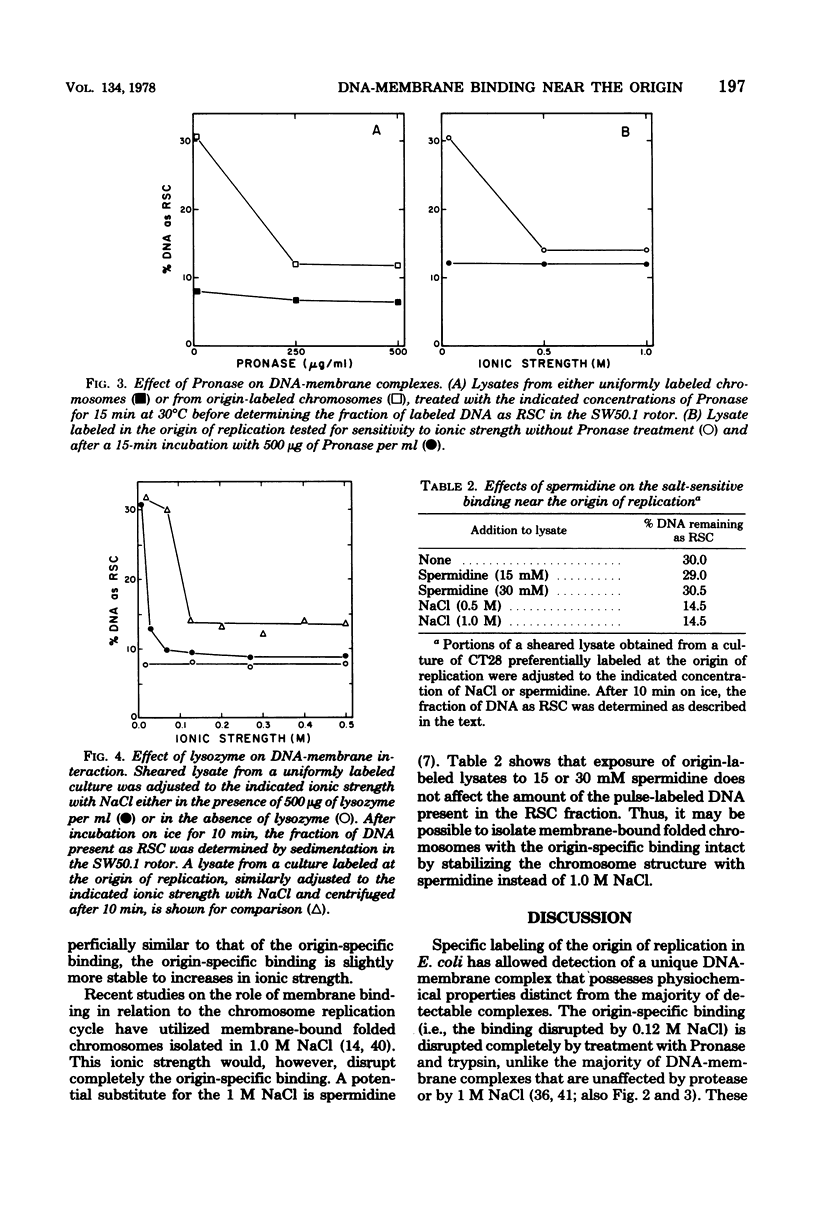
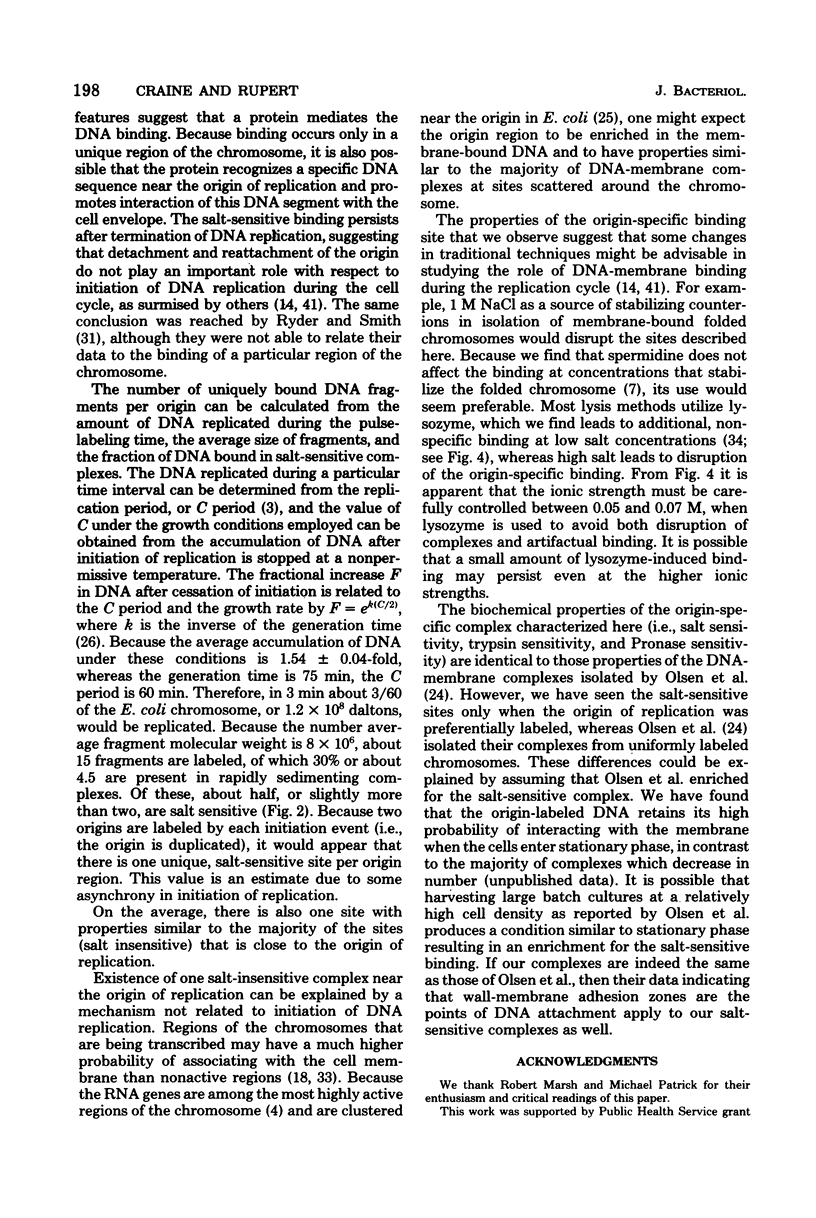
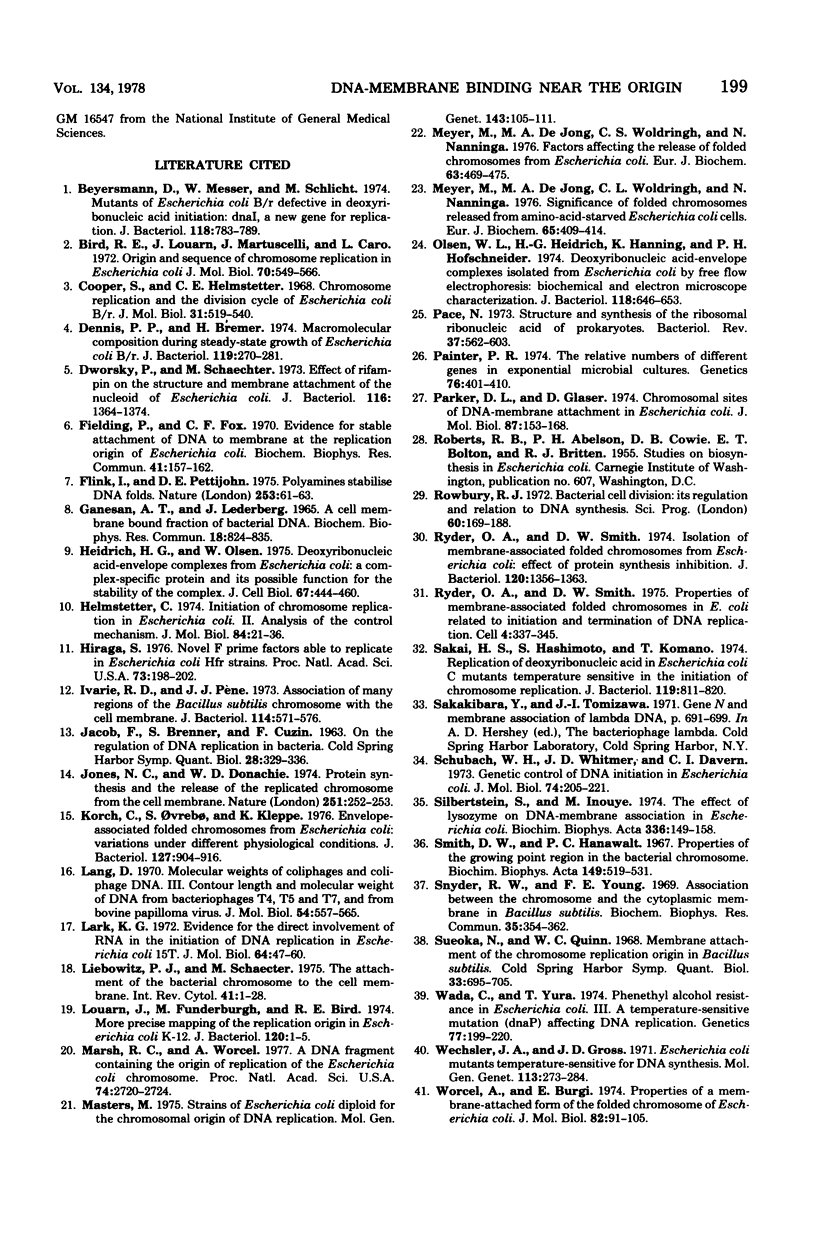
Selected References
These references are in PubMed. This may not be the complete list of references from this article.
- Beyersmann D., Messer W., Schlicht M. Mutants of Escherichia coli B-r defective in deoxyribonucleic acid initiation: dnaI, a new gene for replication. J Bacteriol. 1974 Jun;118(3):783–789. doi: 10.1128/jb.118.3.783-789.1974. [DOI] [PMC free article] [PubMed] [Google Scholar]
- Bird R. E., Louarn J., Martuscelli J., Caro L. Origin and sequence of chromosome replication in Escherichia coli. J Mol Biol. 1972 Oct 14;70(3):549–566. doi: 10.1016/0022-2836(72)90559-1. [DOI] [PubMed] [Google Scholar]
- Cooper S., Helmstetter C. E. Chromosome replication and the division cycle of Escherichia coli B/r. J Mol Biol. 1968 Feb 14;31(3):519–540. doi: 10.1016/0022-2836(68)90425-7. [DOI] [PubMed] [Google Scholar]
- Dennis P. P., Bremer H. Macromolecular composition during steady-state growth of Escherichia coli B-r. J Bacteriol. 1974 Jul;119(1):270–281. doi: 10.1128/jb.119.1.270-281.1974. [DOI] [PMC free article] [PubMed] [Google Scholar]
- Dworsky P., Schaechter M. Effect of rifampin on the structure and membrane attachment of the nucleoid of Escherichia coli. J Bacteriol. 1973 Dec;116(3):1364–1374. doi: 10.1128/jb.116.3.1364-1374.1973. [DOI] [PMC free article] [PubMed] [Google Scholar]
- Fielding P., Fox C. F. Evidence for stable attachment of DNA to membrane at the replication origin of Escherichia coli. Biochem Biophys Res Commun. 1970 Oct 9;41(1):157–162. doi: 10.1016/0006-291x(70)90482-1. [DOI] [PubMed] [Google Scholar]
- Flink I., Pettijohn D. E. Polyamines stabilise DNA folds. Nature. 1975 Jan 3;253(5486):62–63. doi: 10.1038/253062a0. [DOI] [PubMed] [Google Scholar]
- Heidrich H. G., Olsen W. L. Deoxyribonucleic acid-envelope complexes from Escherichia coli. A complex-specific protein and its possible function for the stability of the complex. J Cell Biol. 1975 Nov;67(2PT1):444–460. doi: 10.1083/jcb.67.2.444. [DOI] [PMC free article] [PubMed] [Google Scholar]
- Helmstetter C. E. Initiation of chromosome replication in Escherichia coli. II. Analysis of the control mechanism. J Mol Biol. 1974 Mar 25;84(1):21–36. doi: 10.1016/0022-2836(74)90210-1. [DOI] [PubMed] [Google Scholar]
- Hiraga S. Novel F prime factors able to replicate in Escherichia coli Hfr strains. Proc Natl Acad Sci U S A. 1976 Jan;73(1):198–202. doi: 10.1073/pnas.73.1.198. [DOI] [PMC free article] [PubMed] [Google Scholar]
- Ivarie R. D., Pène J. J. Association of many regions of the Bacillus subtilis chromosome with the cell membrane. J Bacteriol. 1973 May;114(2):571–576. doi: 10.1128/jb.114.2.571-576.1973. [DOI] [PMC free article] [PubMed] [Google Scholar]
- Jones N. C., Donachie W. D. Protein synthesis and the release of the replicated chromosome from the cell membrane. Nature. 1974 Sep 20;251(5472):252–254. doi: 10.1038/251252a0. [DOI] [PubMed] [Google Scholar]
- Korch C., Ovrebo S., Kleppe K. Envelope-associated folded chromosomes for Escherichia coli: variations under different physiological conditions. J Bacteriol. 1976 Aug;127(2):904–916. doi: 10.1128/jb.127.2.904-916.1976. [DOI] [PMC free article] [PubMed] [Google Scholar]
- Lang D. Molecular weights of coliphages and coliphage DNA. 3. Contour length and molecular weight of DNA from bacteriophages T4, T5 and T7, and from bovine papilloma virus. J Mol Biol. 1970 Dec 28;54(3):557–565. doi: 10.1016/0022-2836(70)90126-9. [DOI] [PubMed] [Google Scholar]
- Lark K. G. Evidence for the direct involvement of RNA in the initiation of DNA replication in Escherichia coli 15T. J Mol Biol. 1972 Feb 28;64(1):47–60. doi: 10.1016/0022-2836(72)90320-8. [DOI] [PubMed] [Google Scholar]
- Leibowitz P. J., Schaechter M. The attachment of the bacterial chromosome to the cell membrane. Int Rev Cytol. 1975;41:1–28. doi: 10.1016/s0074-7696(08)60964-x. [DOI] [PubMed] [Google Scholar]
- Louarn J., Funderburgh M., Bird R. E. More precise mapping of the replication origin in Escherichia coli K-12. J Bacteriol. 1974 Oct;120(1):1–5. doi: 10.1128/jb.120.1.1-5.1974. [DOI] [PMC free article] [PubMed] [Google Scholar]
- Marsh R. C., Worcel A. A DNA fragment containing the origin of replication of the Escherichia coli chromosome. Proc Natl Acad Sci U S A. 1977 Jul;74(7):2720–2724. doi: 10.1073/pnas.74.7.2720. [DOI] [PMC free article] [PubMed] [Google Scholar]
- Masters M. Strains of Escherichia coli diploid for the chromosomal origin of DNA replication. Mol Gen Genet. 1975 Dec 30;143(1):105–111. doi: 10.1007/BF00269427. [DOI] [PubMed] [Google Scholar]
- Meyer M., De Jong M. A., Woldringh C. L., Nanninga N. Factors affecting the release of folded chromosomes from Escherichia coli. Eur J Biochem. 1976 Apr 1;63(2):469–475. doi: 10.1111/j.1432-1033.1976.tb10249.x. [DOI] [PubMed] [Google Scholar]
- Meyer M., De Jong M. A., Woldringh C. L., Nanninga N. Significance of folded chromosomes released from amino-acid-starved Escherichia coli cells. Eur J Biochem. 1976 Jun 1;65(2):409–414. doi: 10.1111/j.1432-1033.1976.tb10355.x. [DOI] [PubMed] [Google Scholar]
- Olsen W. L., Heidrich H. G., Hannig K., Hofschneider P. H. Deoxyribonucleic acid-envelope complexes isolated from Escherichia coli by free-flow electrophoresis: biochemical and electron microscope characterization. J Bacteriol. 1974 May;118(2):646–653. doi: 10.1128/jb.118.2.646-653.1974. [DOI] [PMC free article] [PubMed] [Google Scholar]
- Pace N. R. Structure and synthesis of the ribosomal ribonucleic acid of prokaryotes. Bacteriol Rev. 1973 Dec;37(4):562–603. doi: 10.1128/br.37.4.562-603.1973. [DOI] [PMC free article] [PubMed] [Google Scholar]
- Painter P. R. The relative numbers of different genes in exponential microbial cultures. Genetics. 1974 Mar;76(3):401–410. doi: 10.1093/genetics/76.3.401. [DOI] [PMC free article] [PubMed] [Google Scholar]
- Parker D. L., Glaser D. A. Chromosomal sites of DNA-membrane attachment in Escherichia coli. J Mol Biol. 1974 Aug 5;87(2):153–168. doi: 10.1016/0022-2836(74)90140-5. [DOI] [PubMed] [Google Scholar]
- Rowbury R. J. Bacterial cell division: its regulation and relation to DNA synthesis. Sci Prog. 1972 Summer;60(238):169–188. [PubMed] [Google Scholar]
- Ryder O. A., Smith D. W. Isolation of membrane-associated folded chromosomes from Escherichia coli: effect of protein synthesis inhibition. J Bacteriol. 1974 Dec;120(3):1356–1363. doi: 10.1128/jb.120.3.1356-1363.1974. [DOI] [PMC free article] [PubMed] [Google Scholar]
- Ryder O. A., Smith D. W. Properties of membrane-associated folded chromosomes of E. coli related to initiation and termination of DNA replication. Cell. 1975 Apr;4(4):337–345. doi: 10.1016/0092-8674(75)90154-3. [DOI] [PubMed] [Google Scholar]
- Sakai H., Hashimoto S., Komano T. Replication of deoxyribonucleic acid in Escherichia coli C mutants temperature sensitive in the initiation of chromosome replication. J Bacteriol. 1974 Sep;119(3):811–820. doi: 10.1128/jb.119.3.811-820.1974. [DOI] [PMC free article] [PubMed] [Google Scholar]
- Schubach W. H., Whitmer J. D., Davern C. I. Genetic control of DNA initiation in Escherichia coli. J Mol Biol. 1973 Feb 25;74(2):205–221. doi: 10.1016/0022-2836(73)90107-1. [DOI] [PubMed] [Google Scholar]
- Silberstein S., Inouye M. The effects of lysozyme on DNA--membrane association in Escherichia coli. Biochim Biophys Acta. 1974 Oct 11;366(2):149–158. [PubMed] [Google Scholar]
- Smith D. W., Hanawalt P. C. Properties of the growing point region in the bacterial chromosome. Biochim Biophys Acta. 1967 Dec 19;149(2):519–531. doi: 10.1016/0005-2787(67)90180-3. [DOI] [PubMed] [Google Scholar]
- Snyder R. W., Young F. E. Association between the chromosome and the cytoplasmic membrane in Bacillus subtilis. Biochem Biophys Res Commun. 1969 May 8;35(3):354–362. doi: 10.1016/0006-291x(69)90506-3. [DOI] [PubMed] [Google Scholar]
- Sueoka N., Quinn W. G. Membrane attachment of the chromosome replication origin in Bacillus subtilis. Cold Spring Harb Symp Quant Biol. 1968;33:695–705. doi: 10.1101/sqb.1968.033.01.078. [DOI] [PubMed] [Google Scholar]
- Wada C., Yura T. Phenethyl alcohol resistance in Escherichia coli. 3. A temperature-sensitive mutation(dnaP) affecting DNA replication. Genetics. 1974 Jun;77(2):199–220. doi: 10.1093/genetics/77.2.199. [DOI] [PMC free article] [PubMed] [Google Scholar]
- Wechsler J. A., Gross J. D. Escherichia coli mutants temperature-sensitive for DNA synthesis. Mol Gen Genet. 1971;113(3):273–284. doi: 10.1007/BF00339547. [DOI] [PubMed] [Google Scholar]
- Worcel A., Burgi E. Properties of a membrane-attached form of the folded chromosome of Escherichia coli. J Mol Biol. 1974 Jan 5;82(1):91–105. doi: 10.1016/0022-2836(74)90576-2. [DOI] [PubMed] [Google Scholar]


